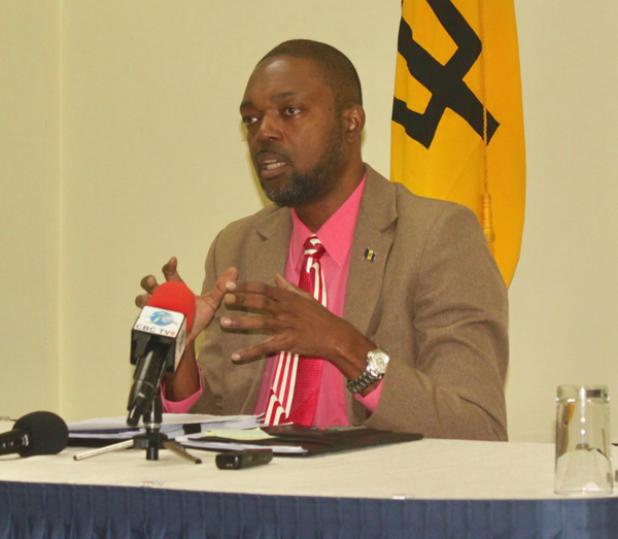
Minister of Labour and Social Partnership Relations, Colin Jordan.
Employers urged to work on communication skills
MINISTER of Labour and Social Partnership Relations, Colin Jordan, is
urging employers to work on their communication with their employees.
His comments came as he joined the debate on the Severance Payment
Act, which was debated in the Lower House on Tuesday night.
He remarked that the decisions taken by the Government went through a
consultative process, which he lamented is not being done by
management in many organisations.
“One of the examples of poor communication that came to my mind quite
forcibly was the view that communication with workers should be done
by the trade union. I was forced to say then and I am going to say it
now, that any organisation that employs workers has the responsibility
to communicate with those workers; the responsibility is not that of
the trade union.
“If I employ people, I have a responsibility to them. And that
responsibility is not to be given to anybody else; just like we tell
parents that the role of parenting is not the role of the teachers.
The role of communicating with the workers, those adults who work with
you, is yours if you have employed them. That has to be a
communication of the good and the not so good.
“What we saw coming through on our consultation was that some
employers seem to have a challenge communicating bad news while
wanting a favourable response. And that says to me that there is not a
culture of communication. Because if there is a culture of
communication, you can sit and dialogue with people and be able to
explain your situation and ask for buy-in.”
The Labour Minister also made it clear that Labour laws are still in
place, in spite of the emergency situation facing the country.
“There is in the minds of quite a number of employers that in
emergency situations, their own responsibility is to write a letter to
the Chief Labour Officer saying they are going to lay off some of
their workers. I want to be very clear and I have said it to the
private sector and I want to say it to the country. In the Employment
Rights Act (ERA), and let me remind employers..., that the pandemic,
the Public Health Emergency legislation, does not get rid of the
pieces of legislation that are on the books in this country.”
He noted that in the ERA, Section 38 Subsection 7C, speaks to
consultation and the steps that are to be taken in laying off workers.
“7C speaks to special circumstances where it is not possible to have
the six-week consultation and all the other things that are required,
but this clause, Mr. Speaker, says that where in any case there are
special circumstances which render it not reasonably practicable for
the employer to comply with any of the requirements of paragraph A and
B, the employer shall immediately consult with the Chief Labour
Officer and take all steps toward compliance with that requirement as
are reasonably practicable in all the circumstances.
“I am saying to managers of businesses that ‘consult’ means ‘consult’.
I shouldn’t have to say that to intelligent people, but I realise from
the discussions we have had that I do have to say that to intelligent
people. ‘Consult’ means ‘consult’. Consultation is not written in a
letter, putting in the post or getting your messenger to deliver. That
is informing. The legislation speaks to consultation and it says you
will do whatever is reasonably practical.
“...Because the action that says ‘all I have to do is send a letter
and tell you you have to go home’, tells me there is a lack of respect
in some quarters for the dignity of the human beings who work in some
organisations.
Jordan, who says he has worked in people management for quite some
time, says he observed that over time there has been a desire for
persons who call themselves or are designated as Human Resources
managers to find their place in an organisation.
“...HR managers have tried over quite a while to get into what is seen
as the top layer of management. And what I have realised, Mr. Speaker,
to my mind an unfortunate direction being taken where those officers
who should be the officers that a worker can turn to when that worker
feels down, feels offended, feels taken advantage of, there are too
many HR managers who try to be rougher than the general manager to
prove to the general manager that they are part of the organisation.
“I just want to say to the HR management. There is no need to try to
prove your value by being tough and rough to workers. Your role is not
to be tough and rough; the general manager, managing director, the
CEO’s role is not to be tough and rough. The role of the HR manager
should be not just to the workers, but to bring a sense of humanity to
the management structure of an organisation and I want to appeal to
human resources managers, people development managers across this
country to be in the vanguard of bringing humanity to any management
structure that does not at this time recognise the full humanity of
workers. Be in the vanguard. Lead the charge. Do the right thing, the
human thing and treat workers in this country as the human beings as
they are,” he urged. (JH)
